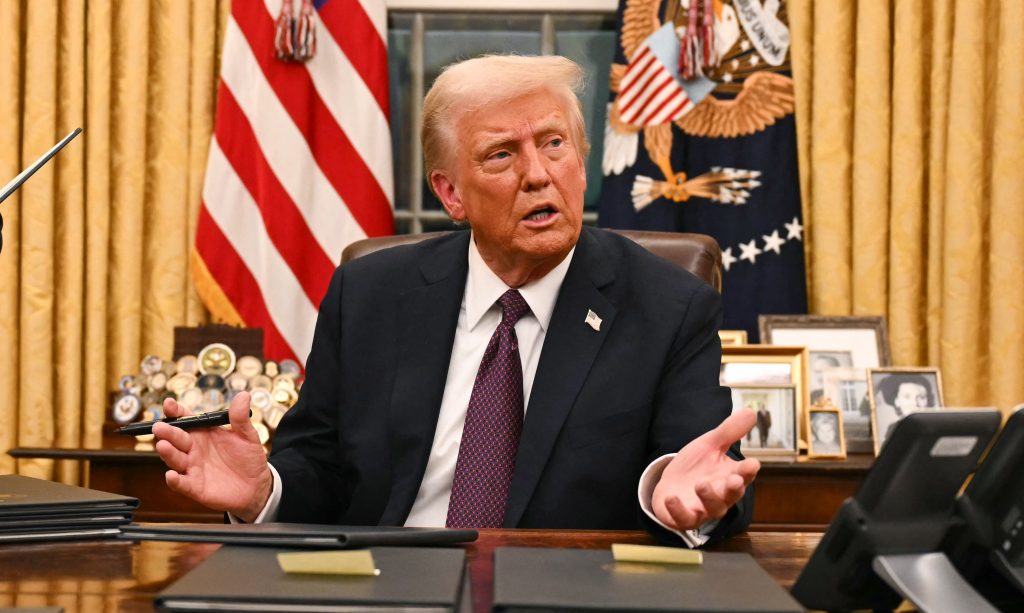President Donald Trump of the United States announced on Thursday that his government would appeal a federal judge’s decision to temporarily halt his attempt to limit birthright citizenship.
When questioned by reporters in the Oval Office regarding the decision by Washington State District Judge John Coughenour, who declared the president’s order to be “blatantly unconstitutional,” Trump responded, “Obviously we will appeal it.”
A federal judge temporarily blocked Trump’s attempt to limit birthright citizenship on Thursday.
The decision puts a 14-day halt on implementing one of the most contentious executive orders that Trump issued just hours after taking the oath of office for a second term.
According to reports, US District Judge John Coughenour stated during the hearing in Washington State, “This is a blatantly unconstitutional order.”
After serving on the bench for over 40 years, Coughenour, whom Republican President Ronald Reagan appointed, stated, “I can’t remember another case where the question presented is as clear as this one is.”
The Department of Justice stated it would defend the executive order, which Trump told reporters his government would “obviously” challenge the decision. According to a spokeswoman, the executive order “correctly interprets” the US Constitution.
The spokesperson stated, “We are eager to present a complete merits argument to the Court and to the American people, who are fervently interested in seeing our nation’s laws enforced.”
According to the 14th Amendment of the US Constitution, anyone born in the US is automatically a citizen.

“All persons born or naturalised in the United States, and subject to the jurisdiction thereof, are citizens of the United States and of the State wherein they reside,” it states, in part.
Trump’s order was based on the notion that anyone entering the US illegally or with a visa was not “subject to the jurisdiction” of the nation and was thus not included in this group.
The Justice Department lawyer Brett Shumate was reprimanded by an astounded Coughenour for claiming that Trump’s order was constitutional.
To be honest, I don’t understand how a lawyer could say categorically that this is a constitutional order, Coughenour remarked.
“I’m just in complete awe.”
The decision follows a wave of lawsuits brought by two cities, 22 states, and a large number of civil rights organisations.
States that participated in the legal proceedings praised it.
“Today’s decision affirms that no president can change the constitution on a whim,” stated Attorney General Kris Mayes of Arizona.
As my office battles against cases of presidential overreach and any unlawful measures the next administration may take, the verdict is “the first of many wins to come.”
Attorney General Nick Brown of Washington called Trump’s directive “un-American.”
Following the decision, he stated, “Birthright citizenship makes clear that citizenship cannot be conditioned on one’s race, ethnicity, or where their parents came from.”
“Until President Trump’s unlawful action, it was the law of our country, acknowledged by generations of jurists, lawmakers, and presidents.”
When he signed the order, Trump had admitted that the legal challenge was likely, so it was not surprising.
He has falsely claimed on numerous occasions that the United States is the only nation in the world having birthright citizenship; in reality, over 30 other nations, including Canada and Mexico, also have this privilege.
Trump’s opponents contend that the 14th Amendment has been a part of American law for more than a century, having been passed in 1868 as the country attempted to rebuild itself following the Civil War.
The US Supreme Court’s 1898 decision in the case of Wong Kim Ark, a Chinese American who was born in San Francisco, has been highlighted by them.
On the basis that he was not a citizen, Wong was refused permission to return to the United States after visiting family in China.
The court upheld that citizenship could not be denied to children born in the United States, including those born to immigrants.


